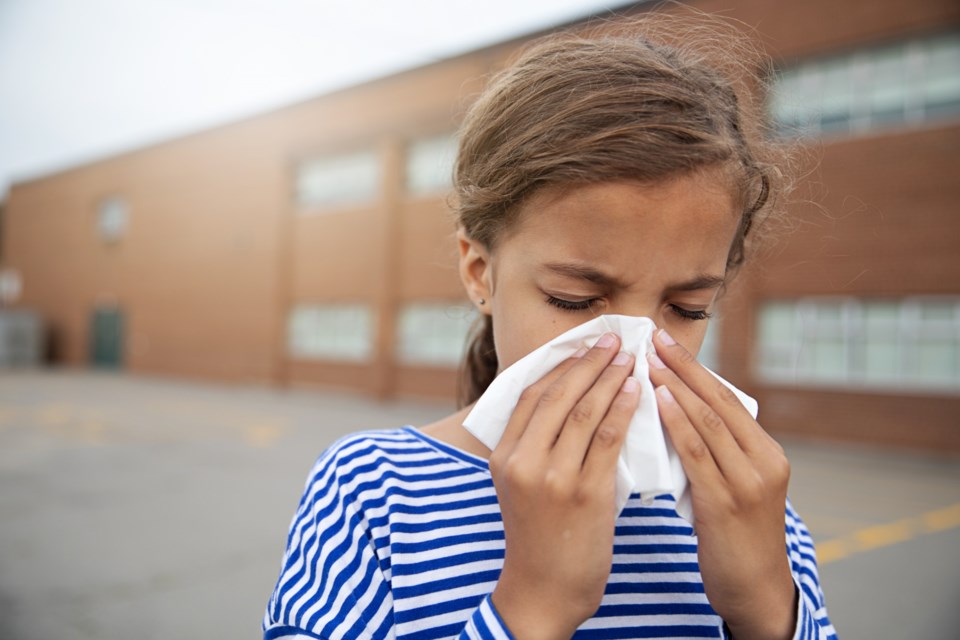A runny nose, sore throat and headache are no longer listed on the COVID-19 health checklist for New West schools.
The New Westminster school district has sent out a new health checklist in response to updated public health guidance form the B.C. Centre for Disease Control. The document has refined the list of symptoms and the directions given around what to do if symptoms arise, a letter from the district notes.
Since the start of the new school year in the midst of the COVID-19 pandemic, families have been required to perform a daily health assessment and to have children stay home if they have any of the listed symptoms.
That list, as of a letter sent to families on Sept. 23, has been substantially pared down from its initial incarnation.
On the new list, parents are required to keep children home if they have any of the listed “key symptoms” and those symptoms are not related to a pre-existing condition such as allergies. Those symptoms are:
- fever
- chills
- cough, or worsening chronic cough
- shortness of breath
- loss of sense of smell or taste
- diarrhea
- nausea and vomiting
The previous list included several other symptoms that have since been removed: runny nose/stuffy nose, sore throat, headache, fatigue, loss of appetite, muscle aches, conjunctivitis, dizziness/confusion, abdominal pain, and skin rashes or discolouration of fingers or toes.
Provincial health officer Dr. Bonnie Henry said the checklist change is based on from data collected across the province and the country, as well as around the world.
She said that some symptoms by themselves are not necessarily a reason to keep a child out of school. But symptoms like a fever or a cough should absolutely keep them home, Henry said. “They’re much more likely to be associated with something that may be transmissible to others, COVID and other things.”
Henry said there is “a bit of leeway” in considering symptoms, and parents and older students can use their judgment.
“It’s a balancing act to make sure that children are able to attend school as much as possible, and minimizing the risk that they pose.”
Under the new guidelines sent to New West parents on Wednesday, if only one symptom, excluding fever, is shown, the child is expected to stay home and be monitored for 24 hours from when the symptom started. If it continues past that time, parents are asked to seek a health assessment.
If the symptom improves, the child may return to school when they feel well enough.
If the child has a fever, or if two or more of the listed symptoms are present, parents are requested to seek a health assessment (by calling 811 or a primary care practitioner) to determine whether a COVID-19 test is required.
If a test is recommended, parents are asked to follow the health professional’s guidance. If it’s not recommended, the child can return to school when symptoms improve and they feel well enough to do so.
If a child has returned from travel outside Canada in the past 14 days, and/or is a confirmed contact of a person confirmed to have COVID-19, a health assessment is required to determine if a COVID-19 test should be done.
The letter from the school district also answers a couple of frequent questions from parents:
What if someone else in our home is sick?
If another person in the house is sick but the child has no symptoms, has not returned from international travel and has not been informed by public health officers that they are a confirmed contact of a person with COVID-19, then the regular health checklist applies.
If none of the above applies and you have not been directed otherwise by public health or another medical professional, then a child exhibiting no signs or symptoms that they’re ill may attend school, if you decide it is appropriate.
What is my child has allergies or this symptom is not new to them?
If the symptom is consistent with a previously diagnosed health condition (such as allergies or asthma), and it is not unusual for your child to have that symptom, they may attend school. No assessment or note will be required from a health provider.
- with files from the Times Colonist



